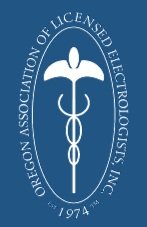
Electrolysis Credentialing, Licenses, and Sanitation Guidelines
-
Credentialing & Licenses
Electrolysis Credentialing
Licenses are granted by the Health Licensing Office.
OALE recognizes 2 credentials:
Licensed Electrologist (LE)
In the state of Oregon, electrolysis is a licensed profession and the practitioner must adhere to certain state laws in order to maintain their license to practice. A Licensed Electrologist (LE) must complete a minimum 600 hours in an approved school of electrolysis, and must pass examinations administered by the Health Licensing Office.
To maintain licensure, a licensed electrologist must complete a minimum of eight (8) continuing education (CE) hours every licensure year
To verify an electrologist's license, check licensing status by visiting Health Licensing Office.
Certified Professional Electrologist (CPE)
The CPE credential signifies that the electrologist has passed the national CPE examination, measuring the electrologist's knowledge against a national standard of excellence.
CPEs must complete 75 hours of continuing educational units (CEUs) in a five-year period to maintain their certification.
-
Sanitation Guidelines
The American Electrology Association (AEA), in conjunction with the Centers for Disease Control and Prevention (CDC), developed national Infection Control Standards that include sterilization of all electrology instruments which may have parenteral contact. The Standards are consistent with Standard Precautions safety which includes hand washing and use of a fresh pair of disposable gloves for each treatment.
The Health Licensing Office also enforces many safety and sanitation standards developed by the AEA and CDC. Sterilization of tweezers / forceps must be in either an autoclave or dry heat sterilizer. Probes must be single-use and disposable. Biological indicator tests for sterilization are required to maintain licensure. Specific disinfecting standards also apply to other equipment and surfaces.
